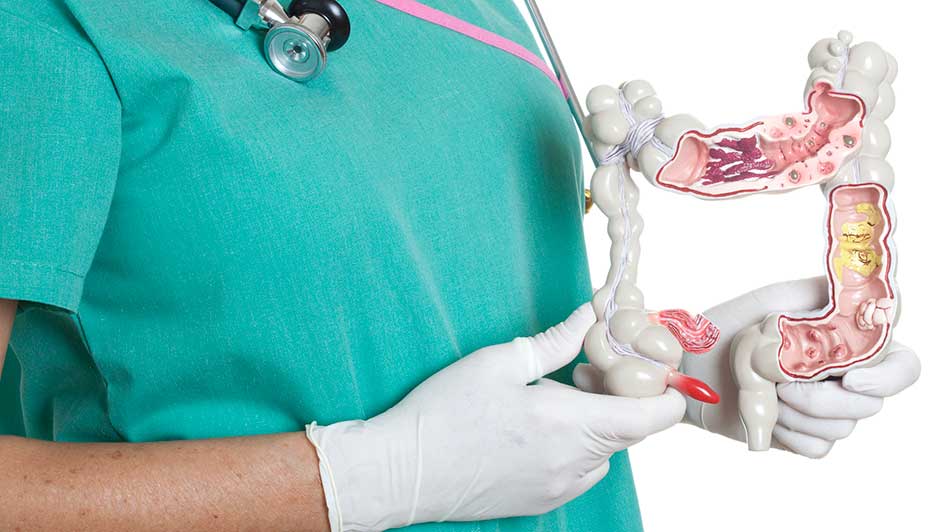Radiologists call for CTC bowel cancer scans, but a better option is close

Special report: Radiologists are calling on the government to add a new bowel cancer diagnostic tool to cut waiting times — but a better test may be just around the corner.
The Royal Australian and New Zealand College of Radiologists (RANZCR) wants CT colonography (CTC) to be included in the Medicare Benefits Schedule in order to cut waiting times for colonoscopies.
“Colonoscopies play a vital role in diagnosing Australians with bowel cancer,” RANZCR president Dr Lance Lawler said.
He said waiting times for colonoscopies were “spiralling” for a disease that, if caught early, has a 90 per cent survival rate.
As an additional tool, CTC — which has an out-of-pocket expense for the patient of about $150 a pop — could cut waiting times for a colonoscopy appointment to 90 days, RANZCR says.
About 17,000 people are expected to be diagnosed with bowel cancer in Australia in 2018.
Around 90 per cent of the people who have returned a positive initial fecal test — the ‘FIT’ test sent out to all adults when they turn 50 and every two years thereafter for most — will have to wait between 116 and 180 days for a colonoscopy.
Research shows that waiting longer than 120 days will not only have poorer outcomes for the patient, but prolong the anxiety that comes with a positive initial test.
Limitations
CTC is not a foolproof technology, however.
Surgical oncologist associate professor Guy Hingston, who practises in Port Macquarie, said one major limitation of CTC was that it was unreliable in detecting polyps and lesions smaller than 5mm.
“To offer CTC as a widespread replacement for colonoscopy would mean we would likely miss a large number of small lesions,” he said.
Dr Trevor Lockett, CEO and managing director of biotech Rhythm Biosciences (ASX:RHY), agrees CTCs are a cruder tool than colonoscopies.
The doctors can remove lesions immediately using a colonoscopy or do further research on it on the spot.
Video: Rhythm Bio (ASX:RHY) is working on a better test for colorectal cancer
“Only around 3 per cent of subjects with a positive initial faecal test end up having cancer,” he told Stockhead.
“CTC could potentially be used as a second tier test to identify those most likely to have cancer and to move them to colonoscopy first. The thing is, however, all patients with a positive faecal test still need to have a colonoscopy so in this sense then, a positive second-tier CTC result would be treated in an identical way to a positive result using some other much less expensive secondary assessment test.”
A test for high risk patients
Rhythm is two years away from commercialising a technology targeted at providing inexpensive blood tests which can accurately identify patients at high risk of having colon cancer.
The ColoStat technology has 13 years of development at CSIRO behind it. It could provide a second — quick — independent assessment for patients who have received a positive initial faecal test.
“Consistency between the two tests may identify people more likely to have colorectal cancer who could be fast tracked to colonoscopy, while a positive result with one and a negative with the other may define a group less likely to have cancer who would still progress to colonoscopy but at a lower priority,” he said.
“The outcome could be a more effective use of our limited colonoscopy facilities and saving more lives by getting those at greatest risk of having bowel cancer to colonoscopy first.”
- Subscribe to our daily newsletter
- Bookmark this link for small cap news
- Join our small cap Facebook group
- Follow us on Facebook or Twitter
The ColoSTAT test measures the concentrations in blood of a set of proteins which are known to change concentration in patients with colorectal colon cancer.
Linking these concentrations via a proprietary algorithm gives a colorectal cancer risk score. A higher score means a patient should get a colonoscopy, a lower one means the person should re-screen in two years’ time.
“ColoSTAT is primarily being positioned as a front-line colorectal cancer screening test for people who cannot, for clinical, personal or cultural reasons do a faeces-based test,” Dr Lockett said.
Pilot manufacturing is expected to begin late in 2018 and clinical trials are planned for 2019 when the company will start collecting data to present to European and Australian regulators.
This special report is brought to you by Rhythm Biosciences.
This advice has been prepared without taking into account your objectives, financial situation or needs. You should, therefore, consider the appropriateness of the advice, in light of your own objectives, financial situation or needs, before acting on the advice.
If this advice relates to the acquisition, or possible acquisition, of a particular financial product, the recipient should obtain a disclosure document, a Product Disclosure Statement or an offer document (PDS) relating to the product and consider the PDS before making any decision about whether to acquire the product.
UNLOCK INSIGHTS
Discover the untold stories of emerging ASX stocks.
Daily news and expert analysis, it's free to subscribe.
By proceeding, you confirm you understand that we handle personal information in accordance with our Privacy Policy.








